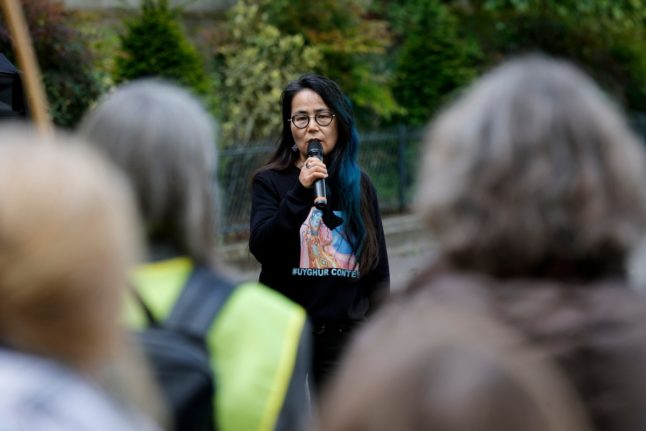Following are some of the defining moments of his mandate which began in 2012 and which he confirmed Thursday would be his last.
Three major terror attacks
Since January 2015, 238 people have been killed in a series of jihadist attacks, mostly the work of French radicals acting in the name of Islamic State (IS) or other extremist groups.
 Hollande leans over the coffin of late Police officer Ahmed Merabet who was killed in the Charlie Hebdo attack in January 2015. Photo: AFP
Hollande leans over the coffin of late Police officer Ahmed Merabet who was killed in the Charlie Hebdo attack in January 2015. Photo: AFP
Hollande won praise for rallying a shocked nation after the first attacks on the satirical Charlie Hebdo magazine and a Jewish supermarket.
Around 50 heads of state joined him on a march against terror that brought over 3.7 million people onto the streets of France.
 Photo: AFP
Photo: AFP
Ten months later, he reacted quickly when IS massacred 130 people in Paris at the Bataclan concert hall, at cafes and bars, and outside the national stadium.
 Hollande flanked by French Prime Minister Manuel Valls and French Education Minister Najat Vallaud-Belkacem stands among students as they hold a minute of silence in the courtyard of the Sorbonne University in Paris on November 16, 2016.
Hollande flanked by French Prime Minister Manuel Valls and French Education Minister Najat Vallaud-Belkacem stands among students as they hold a minute of silence in the courtyard of the Sorbonne University in Paris on November 16, 2016.
Hollande immediately announced a state of emergency, declaring that France was “at war” and deploying troops to patrol the streets.
 Hollande deploys a plaque at the Bataclan concert hall, a prime target of the November attacks in Paris where 130 people were killed on November 13, 2015. Photo: AFP
Hollande deploys a plaque at the Bataclan concert hall, a prime target of the November attacks in Paris where 130 people were killed on November 13, 2015. Photo: AFP
But in July, when a 31-year-old Tunisian mowed down 86 people enjoying Bastille Day festivities in Nice, accusations began to mount that Hollande's government was failing to rise to the threat of extremism.
 Visiting the command centre for France's anti-terror “Vigipirate” plan at the fort of Vincennes, on the outskirts of Paris, in July 2016. Photo: AFP
Visiting the command centre for France's anti-terror “Vigipirate” plan at the fort of Vincennes, on the outskirts of Paris, in July 2016. Photo: AFP
A tumultuous private life
Before coming to office Hollande took jabs at the romantic antics of his predecessor Nicolas Sarkozy — who married supermodel Carla Bruni while president — vowing that on personal matters, he himself would be “exemplary”.
But cracks quickly began to show in Hollande's relationship with long-term partner Valerie Trierweiler, and the couple split after it emerged he had been having an affair with an actress nearly 20 years his junior, Julie Gayet.

 Photo: AFP
Photo: AFP
Trierweiler published a best-selling memoir that proved deeply embarrassing to Hollande, not least through its claim that the Socialist leader disdained the poor.
 Photo: AFP
Photo: AFP
To make matters more complicated, Hollande has four children from an earlier relationship with Environment Minister Segolene Royal.
Violent labour protests
Hollande came to power on a leftist platform — including a top tax rate of 75 percent — but later shifted towards business-friendly policies, notably trying to tackle France's famously rigid labour laws.
 Riot police in Paris during the protests. Photo: AFP
Riot police in Paris during the protests. Photo: AFP
His government suffered months of violent protests this year over reforms designed to make it easier to hire people but also easier to fire them, before finally managing to get a watered-down version passed over the summer.
Foreign wars
Hollande launched a military operation in Mali in January 2013 to stop the advance of Islamists who had taken over swathes of northern Mali, a former French colony.
 Hollande salutes Malian President Ibrahim Boubacar Keita at the Elysee Presidential Palace in Paris. Photo: AFP
Hollande salutes Malian President Ibrahim Boubacar Keita at the Elysee Presidential Palace in Paris. Photo: AFP
The following December, a second operation was launched in the Central African Republic — another former colonial possession — in a bid to restore stability to a country gripped by religious violence.
Jihadists remain active in Mali and a vast portion of the country remains out of government control, while violence also remains rife in CAR.
 Hollande in front of the coffin of a French soldier killed in service in Mali. Photo: AFP
Hollande in front of the coffin of a French soldier killed in service in Mali. Photo: AFP
Hollande also sought to intervene in Syria in 2013, but backed out of air strikes when it became clear that US President Barack Obama did not intend to follow suit.
 Photo: AFP
Photo: AFP
France only began air strikes in Syria in late 2015 as part of an international coalition targeting IS. French raids against IS in Iraq had begun a year earlier in September 2014.
Row over French nationality
After the Paris attacks, Hollande sought to modify the constitution to allow convicted terrorists to be stripped of their French nationality if they were dual-nationals.
The issue sparked fierce debate over the ethics of such a move, with Hollande's Justice Minister Christiane Taubira quitting in protest.
 Hollande and Taubira. Photo: AFP
Hollande and Taubira. Photo: AFP
Hollande finally axed the idea in March. In his announcement Thursday that he would not seek re-election, he flagged up the row as the one major regret of his presidency
Global climate deal
Hollande campaigned hard for the historic climate agreement signed in Paris last December, and hailed it in his speech Thursday as one of his key achievements.
 Celebrating the the adoption of a historic global warming pact at the COP21 Climate Conference in Paris. Photo: AFP
Celebrating the the adoption of a historic global warming pact at the COP21 Climate Conference in Paris. Photo: AFP
 Hollande shakes hands with Ecuadorians at a stand at the COP21 summit in Paris. Photo: AFP
Hollande shakes hands with Ecuadorians at a stand at the COP21 summit in Paris. Photo: AFPGay marriage
The Socialist leader had made “marriage for all” one of his election pledges, and same-sex marriages were signed into law in April 2013, despite angry protests by tens of thousands of social conservatives.



 Please whitelist us to continue reading.
Please whitelist us to continue reading.
Member comments